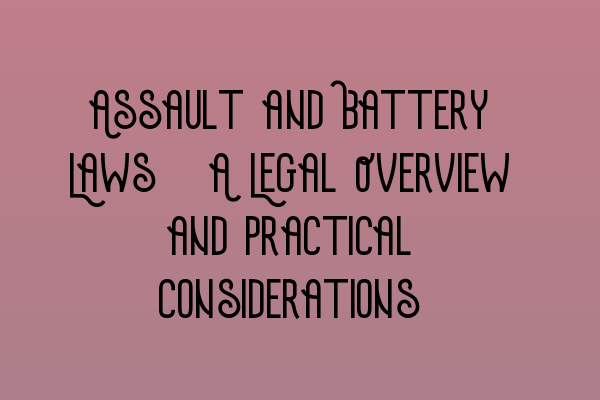Assault and Battery Laws: A Legal Overview and Practical Considerations
Assault and battery are two of the most common criminal offenses, but many people do not fully understand the legal implications and practical considerations associated with these charges. In this blog post, we will provide a comprehensive overview of assault and battery laws in the UK, explaining key legal concepts and offering practical advice for individuals facing these charges.
Understanding Assault and Battery
Before diving deeper into assault and battery laws, it’s essential to understand the basic definitions. Assault refers to the intentional causing of apprehension or fear of immediate physical harm, while battery involves the intentional and unwanted physical contact or force applied to another person without their consent.
Assault and battery can occur separately or together, with assault typically preceding battery. It’s important to note that assault does not require physical contact, whereas battery does. Both offenses can result in serious legal consequences, including imprisonment, fines, and a criminal record.
The Legal Framework
Assault and battery laws are governed by both statutory provisions and common law principles. The SQE 1 Practice Exam Questions will test your knowledge of the relevant legislation and case precedents. Familiarizing yourself with the legal framework is crucial to understanding your rights, potential defenses, and the prosecution’s burden of proof.
In the UK, the offenses of assault and battery fall under the ambit of both the Criminal Law Act 1967 and the common law. The Criminal Law Act 1967 provides a statutory definition of common assault, while the common law governs the more serious offenses.
Penalties and Sentencing
The penalties for assault and battery vary depending on the severity of the offense and other factors, such as the presence of aggravating circumstances, the defendant’s criminal history, and any harm caused to the victim. It’s essential to consult with an experienced criminal defense solicitor to assess the potential penalties you may face based on the specifics of your case.
For minor assaults, Magistrates’ Court has the jurisdiction to impose a maximum sentence of six months’ imprisonment and/or a fine. More serious offenses, such as assault occasioning actual bodily harm or grievous bodily harm, are triable either in the Magistrates’ Court or the Crown Court, with substantially higher maximum penalties.
Defenses to Assault and Battery Charges
Mounting a strong defense is crucial when facing assault and battery charges. Depending on the circumstances of your case, potential defenses may include:
- Self-defense or defense of another person
- Lack of intent
- Consent
- Mistaken identity
- Intoxication
The success of these defenses may depend on the availability of supporting evidence and expert legal arguments. Consulting with a knowledgeable criminal defense solicitor, such as those at SQE 1 Practice Mocks FLK1 FLK2, is critical to developing a strong defense strategy tailored to your specific case.
Practical Considerations
If you find yourself facing assault and battery charges, it’s important to take certain practical considerations into account:
- Seek legal representation: Engaging an experienced criminal defense solicitor is essential to protect your rights and secure the best possible outcome.
- Document the incident: Gather any evidence, such as photographs, videos, or witness statements, that may support your defense or undermine the prosecution’s case.
- Follow legal advice: Listen to your solicitor’s guidance and follow their advice throughout the legal process. They have the expertise to navigate complex legal procedures and ensure your rights are upheld.
- Prepare for court appearances: If your case proceeds to trial, ensure you are well-prepared by reviewing the evidence, familiarizing yourself with potential cross-examination questions, and understanding courtroom procedures.
By following these practical considerations and working closely with a reputable criminal defense solicitor, such as those offering SQE 2 Preparation Courses and SQE 1 Preparation Courses, you can enhance your chances of a successful defense against assault and battery charges.
Conclusion
Assault and battery charges are serious criminal offenses that carry significant legal consequences. Understanding the legal framework, potential penalties, available defenses, and practical considerations is crucial to protect your rights and mount a strong defense. If you find yourself facing assault and battery charges, seek legal guidance from experienced solicitors at SQE Criminal Law & Practice Law UK and ensure your interests are well-represented.
For more information about SQE exam dates and preparation resources, visit our page on SRA SQE Exam Dates.
